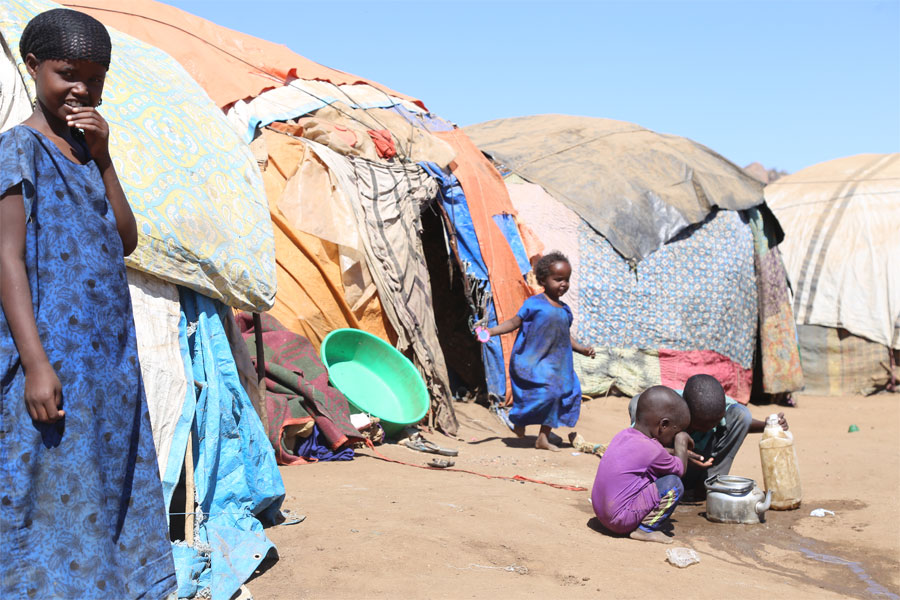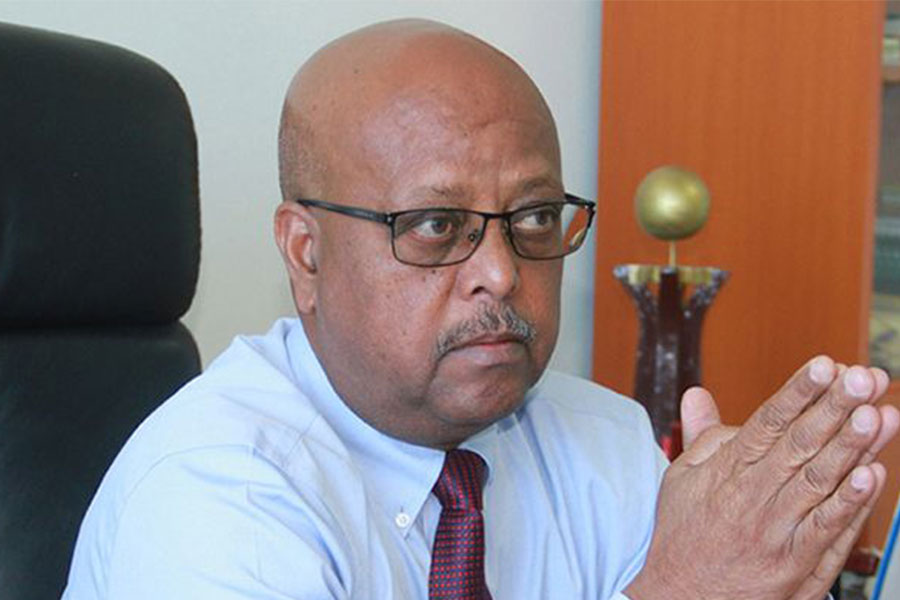
Editorial | Jun 04,2022
Amidst the frosty and foggy crack of dawn, Habtam Kassaun made her way to the Lamberet Bus Terminal located on the outskirts of Addis Abeba.
With a jerrycan of soap and a giant backpack, the 21-year-old arrived at the northeastern terminal hoping to catch a bus to Dessie town in Amhara Regional State, where she is a sophomore nursing student at the Health Science College.
Hundreds sparsely roam around the Lamberet Terminal, which serves as a departure point for passengers travelling to conflict-ridden Amhara and Tigray regional states through the Dessie Ber exit.
The routes frequently change due to the sporadic conflicts erupting at different points.
"My bus is not going," said Habtam while she clenched tightly at the yellow plastic bag which had her clothes.
She had spent the summer with extended family in the capital around the Shola area and was hoping to go back before classes commenced. Buying flight tickets will be her last option if she wishes to continue with her plans.
"I'll be flying to Komoblcha now," Habtam told Fortune, dreading the extra 4,850 Br she has to spend and a taxi drive to Dessie town.
The prior day, Habtam had paid 1,030 Br for a seat at one of the "special" buses that feature WiFi, air conditioning, snack and instilled bathroom services, hoping for a comfortable ride. The ones without such accommodations fetch around 322 Br but have doubled in price due to the necessary route changes.
Habtam did not want to risk the trip for fear of arriving after dark.
The Lamberet Terminal can hold up a 100 buses across its two sections; the smaller section has minibuses and Isuzu vehicles, while the other has large Daewoo and Tata buses tightly parked next to each other. The larger buses have bundles of clothes and food items piled atop their roofs with tariffs and destinations plastered across their window.
Driving across the regional states has become a source of frustration and a safety challenge for transporters and passengers.
A long-distance driver for the past six years, Sintayehu Mengiste claims to be in constant fear every time he starts the engine on his white and green Daewoo bus. The father of two earns 6,000 Br monthly salary and a daily allowance paid on long journeys.
"This is the only job I know how to do," he told Fortune.
Sintayehu argues that the increase in fare barely covers the cost of the travel as security risks have forced them to an additional 180Km distance to avoid conflict and informal checkpoints.
A trip to Dessie town now requires a detour through Metahara and Mille towns within the Oromia and Afar regional states. Sintayehu said the unconventional heat through the Afar desert damages the vehicles and frustrates passengers as the old buses do not have air conditioning.
He is always on the edge of his seat as he drives his 63-seater bus.
"The roads can be difficult to navigate and safety is often a concern," Sintayehu told Fortune.
The Lamberet terminal is one of five long-distance transport hubs in the capital with Asko, Qality, AyerTena and AutobisTera (which has two terminals) being the most famous of all.
Passengers to and from these terminals have decreased by nearly half a million between July and September compared to 4.5 million during last year's same period.
The lull in long-distance transport not only impacts drivers and passengers but takes its toll on the youth in the area who make a living by queueing up buses and passengers for the journey.
Draped in khaki overcoats, these young men take commission fees per bus that leaves their terminal and link up passengers with drivers.
Although a number of holidays are lined up in the season, Alemu Demisse who comes to the terminal at the break of dawn every morning, observes the terminal go dry of customers.
He recalls September being a peak for business as students make their way to colleges while families come together for consecutive holidays, competing for available seats in order to beat a seasonal price hike.
"The buses used to vanish into thin air by dawn," Alemu told Fortune.
The number of buses that made their way across the terminal has declined by 440 between July and September, while 50,000 fewer people travelled compared to the 1.1 million same period last year.
He said an extensive deliberation on safe routes precedes every journey the drivers make nowadays. He noted elevated security concerns, indicating that passengers also berate them on the safety of the roads.
As the day progresses, the larger buses with higher prices due to the elongated route start to fill up and depart while the mini-bus drivers start calling out for passengers headed to destinations near the capital. Shorter routes may sometimes only reach Dukem town, which has a 20 Br tariff.
Close to 2,000 buses are registered by the Ministry of Transport & Logistics, with 384 being luxury vehicles. They provide long-distance transport services operating under 15 associations while two are privately owned.
The precarious conditions of the public transport sector have pushed several people out of business opting to try their hand elsewhere.
Demelash Admasu used to be the proud owner of a public transport company called Yegna Bus, which had 17 vehicles under its fleet until last year. He had entered the business with 100 million Br capital after decades in the import-export sector.
Demelash blames the unpredictable security status for being forced to sell the company to Africa Express Bus.
"The cars were stationary nearly half the time," he told Fortune.
Yegna was started with bank loans which ended with the right of set off of a massive chunk of the 50 million Br annual revenues of the company. Demelash went back into the import-export business he knows by heart, regretting the day he entered the transport sector.
The former manager recalls his short stint in public transport indicating that he had been considering selling since Covid times.
"Any monetary value we earned was absorbed by inflation," he ruefully told Fortune.
The 19 luxury transport service providers who have banded together to form an association at the request of the Ministry have not been spared from the plights of the transport sector.
Muluken Melese is the chief executive of the Luxury Buses Associations & Companies Union and manager of Habesha Bus Transport with 16 buses under its fleet.
The Union adjusts tariff rates by considering the price of fuel, loading capacities and daily expenses. Muluken was quick to stress that they are not part of the fuel subsidy program provided by the government as opposed to some transport service providers.
"Most owners are sitting on huge debt," Muluken told Fortune, indicating the purchases through 50pc bank loans. He said both owners and drivers are choosing to work in routes with guaranteed safety, creating queues of buses waiting for customers.
He fondly recalls a few years back when drivers used to make their way up to Khartoum, Sudan, after having passed through Gonder Amhara Regional State.
"A few kilometres outside the capital is a challenge now," he said.
The luxury buses cost around 18 million Br each, with interest payments compounding when the owners fail to pay. It costs nearly three times as much as regular ones while providing upgraded services.
Muluken recommends banks provide grace periods, as he points to the prevailing economic downturn with the rise of conflict and tension in most parts of the country.
Officials from the Ministry of Transport & Logistics said they have no mandate over private vehicle owners to get on journeys without their volition.
Mustafa Jemal, head of public transport management at the Ministry underscores the government can only assign routes for the vehicles while the terminal directories decide on the safety of the roads.
The intricate connection between transport and security is evident to academics and economists alike.
Birhanu Zeleke (PhD) is the head of transportation at Kotebe Metropolitan University. He stressed the transport infrastructure goes beyond asphalt and includes every other facet of social life where people are opting to use other modes of transportation such as aeroplanes than risk their safety in these trying times.
"Roads and railways are most sensitive to security," he told Fortune, referring responsibility of maintaining the security of the country as the duty of the government.
Economists such as Atlaw Alemu (PhD) consider transport as a vital lifeline of the economy, reasoning that no amount of production matters if goods and services cannot be delivered across the country.
He argues that there is trouble in every corner, with people's insecurity growing by the day describing the plight as a "mess".
While Atlaw reminded that a large portion of the population cannot afford regular air fairs, he told Fortune that lineation towards it might serve as an indicator of security challenges in other modes of transport.
He said: "Flights used to be preferred for speed; now they are a safety precaution."
PUBLISHED ON
Sep 23,2023 [ VOL
24 , NO
1221]

Radar | Jul 28,2024

Fortune News | Nov 21,2018

Fortune News | Mar 09,2019

Verbatim | Oct 11,2025

Radar | Mar 21,2020

Dec 22 , 2024 . By TIZITA SHEWAFERAW
Charged with transforming colossal state-owned enterprises into modern and competitiv...

Aug 18 , 2024 . By AKSAH ITALO
Although predictable Yonas Zerihun's job in the ride-hailing service is not immune to...

Jul 28 , 2024 . By TIZITA SHEWAFERAW
Unhabitual, perhaps too many, Samuel Gebreyohannes, 38, used to occasionally enjoy a couple of beers at breakfast. However, he recently swit...

Jul 13 , 2024 . By AKSAH ITALO
Investors who rely on tractors, trucks, and field vehicles for commuting, transporting commodities, and f...

Nov 1 , 2025
The National Bank of Ethiopia (NBE) issued a statement two weeks ago that appeared to...

Oct 25 , 2025
The regulatory machinery is on overdrive. In only two years, no fewer than 35 new pro...

Oct 18 , 2025
The political establishment, notably the ruling party and its top brass, has become p...

Oct 11 , 2025
Ladislas Farago, a roving Associated Press (AP) correspondent, arrived in Ethiopia in...